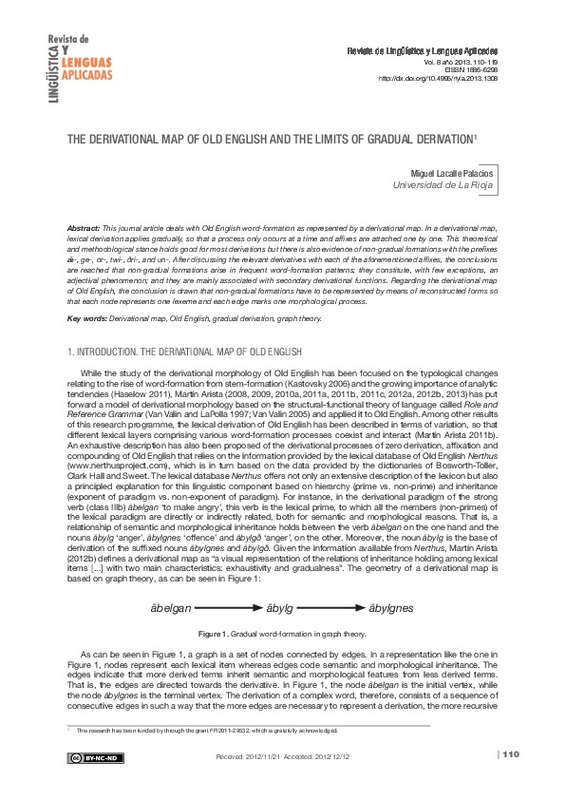Beard, R. and Volpe, M. (2005). "Lexeme-Morpheme Base Morphology", in P. Stekauer and R. Lieber (eds.), Handbook of Word-Formation. Dordrecht: Springer, 189-205. http://dx.doi.org/10.1007/1-4020-3596-9_8
Bosworth, J. and T. N. Toller. 1973 (1898). An Anglo-Saxon Dictionary. Oxford: Oxford University Press.
Clark Hall, J. R. 1996 (1896). A Concise Anglo-Saxon Dictionary. Toronto: University of Toronto Press.
[+]
Beard, R. and Volpe, M. (2005). "Lexeme-Morpheme Base Morphology", in P. Stekauer and R. Lieber (eds.), Handbook of Word-Formation. Dordrecht: Springer, 189-205. http://dx.doi.org/10.1007/1-4020-3596-9_8
Bosworth, J. and T. N. Toller. 1973 (1898). An Anglo-Saxon Dictionary. Oxford: Oxford University Press.
Clark Hall, J. R. 1996 (1896). A Concise Anglo-Saxon Dictionary. Toronto: University of Toronto Press.
Haselow, A. (2011). Typological Changes in the Lexicon. Berlin: Mouton de Gruyter. Kastovsky, D. (2006). "Typological Changes in Derivational Morphology", in A. van Kemenade and B. Los (eds.), The Handbook of The History of English. Oxford: Blackwell, 151-177.
Martín Arista, J. (2008). "Unification and separation in a functional theory of morphology", in R. Van Valin (ed.), Investigations of the Syntax-Semantics- Pragmatics Interface. Amsterdam: John Benjamins, 119-145.
Martín Arista, J. (2009). "A Typology of Morphological Constructions", in C. Butler and J. Martín Arista (eds.), Deconstructing Constructions. Amsterdam: John Benjamins, 85-115.
Martín Arista, J. (2010a). "Lexical negation in Old English", NOWELE-North-Western European Language Evolution 60/61: 89-108.
Martín Arista, J. (2010b). "OE strong verbs derived from strong verbs", SKASE Journal of Theoretical Linguistics 7: 36-56.
Martín Arista, J. (2011a). "Projections and Constructions in Functional Morphology. The Case of Old English HRĒOW", Language and Linguistics 12/2: 393-425.
Martín Arista, J. (2011b). "Adjective formation and lexical layers in Old English", English Studies 92/3: 323-344. http://dx.doi.org/10.1080/0013838X.2011.564776
Martín Arista, J. (2011c). "Morphological relatedness and zero alternation in Old English", in P. Guerrero Medina (ed.), Morphosyntactic Alternations in English. London: Equinox, 339-362.
Martín Arista, J. (Forthcoming-a). "The Old English Prefix Ge-: A Panchronic Reappraisal", Australian Journal of Linguistics.
Martín Arista, J. (Forthcoming-b). "Lexical database, derivational map and 3D representation", Revista Española de Lingüística Aplicada.
Martín Arista, J. (Forthcoming-c). "Recursivity, derivational depth and the search for Old English lexical primes", Studia Neophilologica.
Martín Arista, J. (Forthcoming-d). "Noun layers in Old English". Pounder, A. (2000). Processes and Paradigms in Word-Formation Morphology. Berlin: Mouton de Gruyter.
Sweet, H. 1976 (1896). The Student's Dictionary of Anglo-Saxon. Cambridge: Cambridge University Press.
Van Valin, R. (2005). Exploring the Syntax-Semantics Interface. Cambridge: Cambridge University Press. http://dx.doi.org/10.1017/CBO9780511610578
Van Valin, R. and LaPolla, R. (1997). Syntax: Structure, meaning and function. Cambridge: Cambridge University Press. http://dx.doi.org/10.1017/CBO9781139166799
[-]








